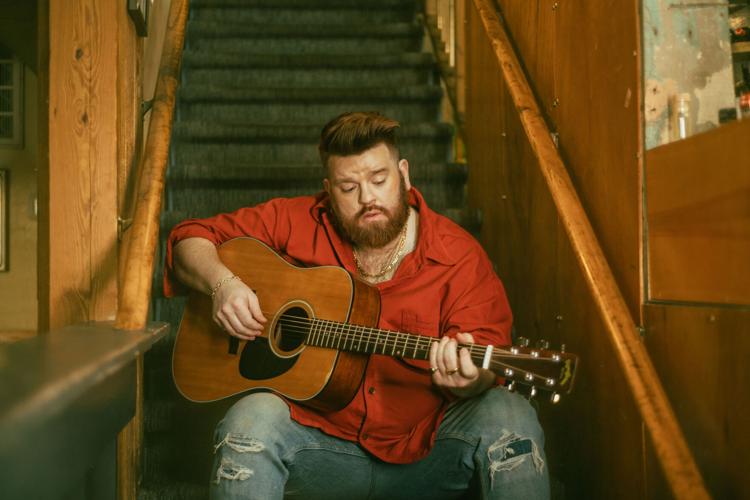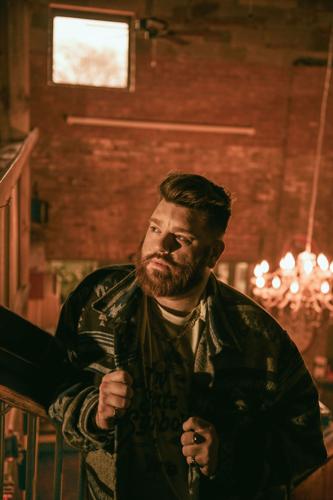
Fancy Hagood
Country music is unique in its insistence on tradition and “doing things the right way” even as artists constantly borrow from pop and underground music to move the genre forward. It’s only when Music Row decides to embrace a chosen few outsiders that they are regarded as having done things “the right way” the whole time. In the weeks since Trump’s election, we are already seeing the country establishment hedge its bets when it comes to embracing diversity and offering a vision of country music that reflects everyone who lives in this country. In 2025, we will need country artists who are unapologetically themselves — like Fancy Hagood, who sings lyrics like: “Wish I knew then what I know now / Never wanna be someone else / Wish somebody would’ve told me / ‘No one’s comin’, you gotta save yourself.’”
“Savior Self,” the thesis statement from Hagood’s 2024 album American Spirit, could easily be performed as an anthem. But Hagood croons the song intimately, singing it like a lullaby in the face of a world that constantly batters a person’s sense of self-worth.
Hagood has always communicated best through music. Growing up a shy kid in Bentonville, Ark., he sang to strangers long before he was willing to speak to them.
“I would sing to anyone, anywhere,” Hagood recalls. “My sister used to parade me door-to-door in our neighborhood to make me sing the national anthem — which is cringe looking back, but very funny.”
Hagood suspects there is some “past-life stuff” at work here. Even as a child, he knew he didn’t quite fit in with the people around him — except when he was performing.
“In my day-to-day life, I felt like a performer onstage without their instrument,” he says. “Onstage, I always felt the most grounded and centered in myself.”
At 17, Hagood moved to Nashville to study at Trevecca Nazarene University. He also began seriously pursuing a career as a singer-songwriter, drew the attention of such industry magnates as Scooter Braun and Scott Borchetta, and dropped out of school. His path took him to Los Angeles, where a campaign to infuse his dance-pop single “Goodbye” with a bit of mystery — he was billed as Who Is Fancy? and his identity was kept secret for several weeks — helped push the track to No. 29 on Billboard’s Mainstream Top 40 chart. When he reached a dead end, he returned to Music City, because country music lies close to his heart.
“Pop songwriting feels a bit more formulaic than it does in country music,” says Hagood. “It’s a different approach to writing. I like writing how I feel. I started writing songs when I was in high school and having a hard time fitting in as a queer kid in Bentonville. Writing became the way I got my emotions out.”
Hagood came out as gay shortly after his initial move to Nashville. Raised in the Church of the Nazarene, he expected his parents to take the news with some difficulty, so he consulted his religion professors and researched queer theology before speaking with them — developing the scriptural chops to counter arguments he expected them to raise. He returned home for winter break with a plan: Rather than argue, he would show his parents how much happier he was, and that the things they believed about queer people were not true.
“I wanted to show my parents that I’m still me — just a little lighter and a lot happier,” Hagood says. “They were amazing. They came around really quickly and were very accepting.”
From there, Hagood “knocked down the closet door and rode out on a unicorn.” He bleached his hair platinum-blond and wore makeup on and off the stage, earning the nickname “Fancy” (referencing Drake’s hit) from his co-workers at the Forever 21 in the Opry Mills mall. While his vibrant authenticity thrilled audiences, Music Row wasn’t sure how to handle him.
“I ended up moving to L.A. because people were excited about me in Nashville as a songwriter, but my dream has always been to be a performer, performing songs I wrote,” he says. “And a lot of people here didn’t understand how someone like me could be successful in that market.”
Hagood signed a publishing deal with Big Machine in 2013, which led to further opportunities with Dr. Luke’s Prescription Songs and then a deal with Republic Records in L.A. Unfortunately, his experience with the music business environment in the City of Angels turned out just as regressive as people assume mainstream country to be.
“I didn’t feel any shame around my sexuality as an entertainer until I moved to L.A.,” says Hagood. “When you’re having these big meetings about pop songs that are on the radio and being heard across the country, the conversation is all about Middle America: ‘What does Middle America think about this? How can we make you palatable? We need to tone this down.’”
In L.A., Hagood “really started feeling the hardship of being queer in the music industry.”
Although “Goodbye” cracked the top 100 of Billboard’s all-genre singles chart and even led to touring with Ariana Grande and Meghan Trainor, Hagood’s momentum abruptly collapsed when his deals ran out. He returned to Nashville and began tending bar. Humbling as the experience was, Hagood found he had everything he needed to start again. His persistence has led to international touring, appearing on the Grand Ole Opry, befriending beloved actor Leslie Jordan, collaborating with a slew of artists inside and outside the country world — including a standout appearance alongside TJ Osborne (of Brothers Osborne) and Waylon Payne on Orville Peck’s cover of “Rhinestone Cowboy” — and much more.

Fancy Hagood
“My goal is to do music for a living,” Hagood says. “For a lot of people, music is considered a passion — but I’ve made a career out of my passion. Anything past that, including this interview and the tour, are cherries on top. My dream is already manifested into reality.”
That change of perspective is part of what makes American Spirit — Hagood’s second country album, following 2021’s Southern Curiosity — his best work yet. In the aftermath of an intense breakup, Hagood turned to his teenage coping mechanism: songwriting.
“I was needing songs of hope,” he says. “I was needing songs of healing. I did not want to write a bunch of sad songs. I don’t want that to be my story. I want my story to be about reclaiming my power, reclaiming my independence, finding who I am.”
Hagood knows this isn’t an egotistical exercise. He cites Elizabeth Gilbert’s Big Magic as he points out that art comes from something that exists outside of ourselves, something that we all experience, and that it’s an individual artist’s task to translate that something in a way that other people can understand, embrace and articulate. Giving people a new way to access their truths is worth all the pain.
“[Producer and friend] Jarrad K’s studio is soaked in my tears because of the amount of times I just couldn’t handle what I was singing about,” Hagood recalls. He surrounded himself with longtime friends and collaborators like Caitlyn Smith, Mindy Smith, Sean McConnell, John Osborne of Brothers Osborne and even actress Mary Steenburgen (who has a co-writing credit on “Soulmates”). “They gave me all the time and space to create, to be, to feel.”
Perhaps that’s why American Spirit feels like a nurturing hug, with Hagood’s intimate tones buttressed by a musical background that shimmers with gentle percussion and fingerpicked acoustic guitars, occasional electronic elements and electric guitars that roar in the distance. Even in the embers of Hagood’s grief, it feels like there is something newer and better pulsating beneath the surface. The songsmith knows he is able to create at this level because his team, including manager Natalie Osborne, understands that he cannot compromise himself.
“I’ve learned the true power of a shared vision, and I’ve learned how to articulate my vision,” he says. “Having that has just unlocked so much in my career. I think there are a lot of well-intentioned people in the music business, but people make decisions based off fear. And I live in faith. I don’t think of myself in the music business anymore. I’m in the Fancy Hagood business.”
Hagood sees new opportunities: Artists have more and more viable options for sustaining themselves beyond major label deals and terrestrial radio.
“My favorite message I get from fans is, ‘I didn’t know I loved country music until I heard your album,’ or, ‘I never thought I would see a queer country artist,’” Hagood says. “It gives me chills every single time someone says it to me. I’m trying to broaden the scope of country music and invite other people to the table — invite other people to the party, and let them know that this is not a narrow lane for one group of people. Country music is for everyone.”
To that point, Hagood sees optimism in the adversity that is sure to come under the Trump administration.
“We exist in a space where queerphobia is already a thing,” he says. “I don’t want to name names, but there are some big acts that speak very negatively about the trans community. It’s already so present here in Nashville, and we are already working around it.”
Ultimately, Hagood hopes to see more and more people determined to share their stories and experiences.
“Art is what brings us all together,” says Hagood. “Music has saved me time and time again. I’m tired of the divisiveness. I want to be a voice that brings people together with my music. … It’s just too important to me to never try to be something I’m not. That was the name of my career for so long, and it’s not something I ever want to do again. I want to be my authentic, real, vulnerable self — always.”
Talking 'American Spirit' with Fancy Hagood, considering the impact of Beyoncé’s 'Cowboy Carter' and much more







